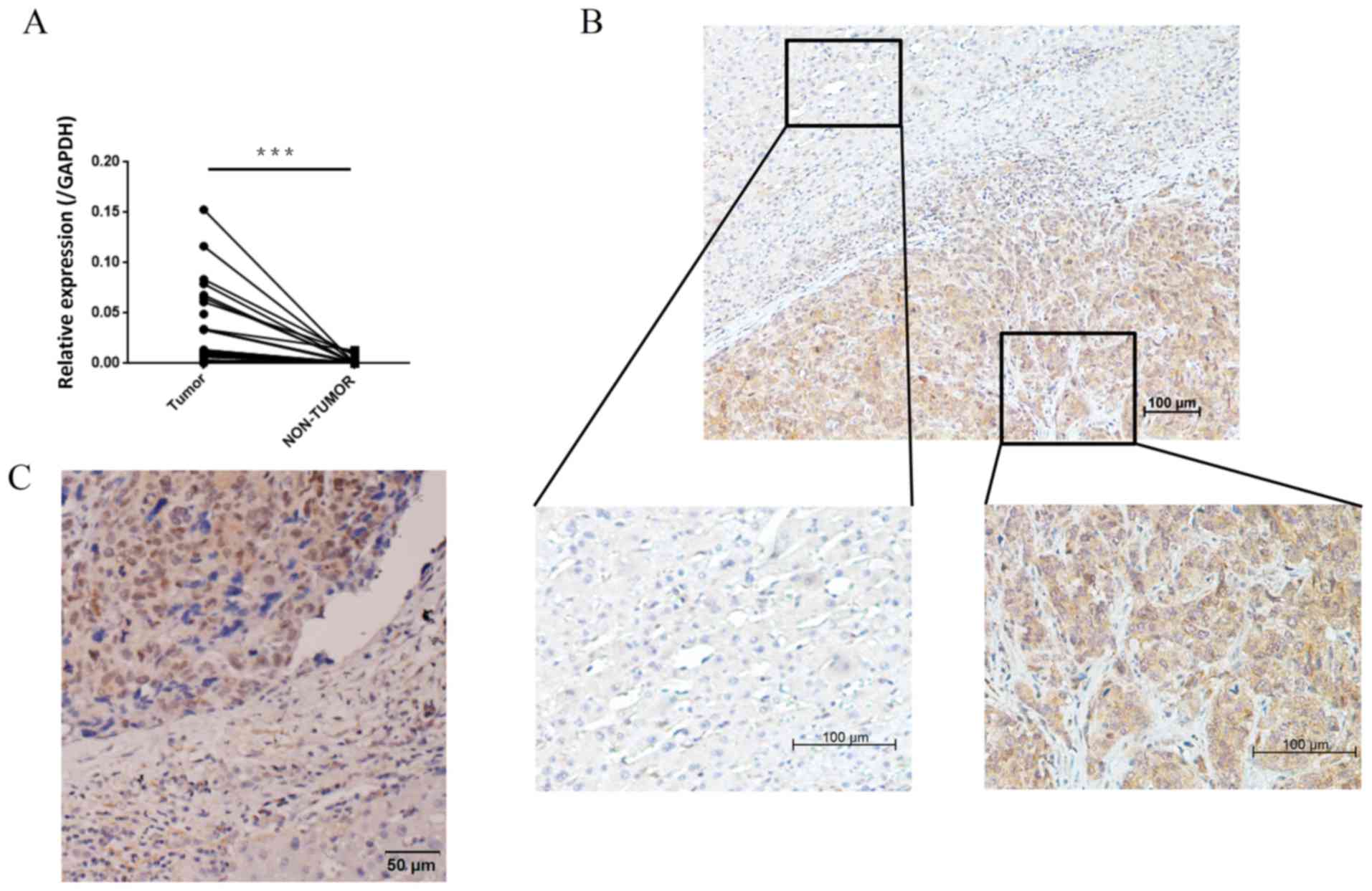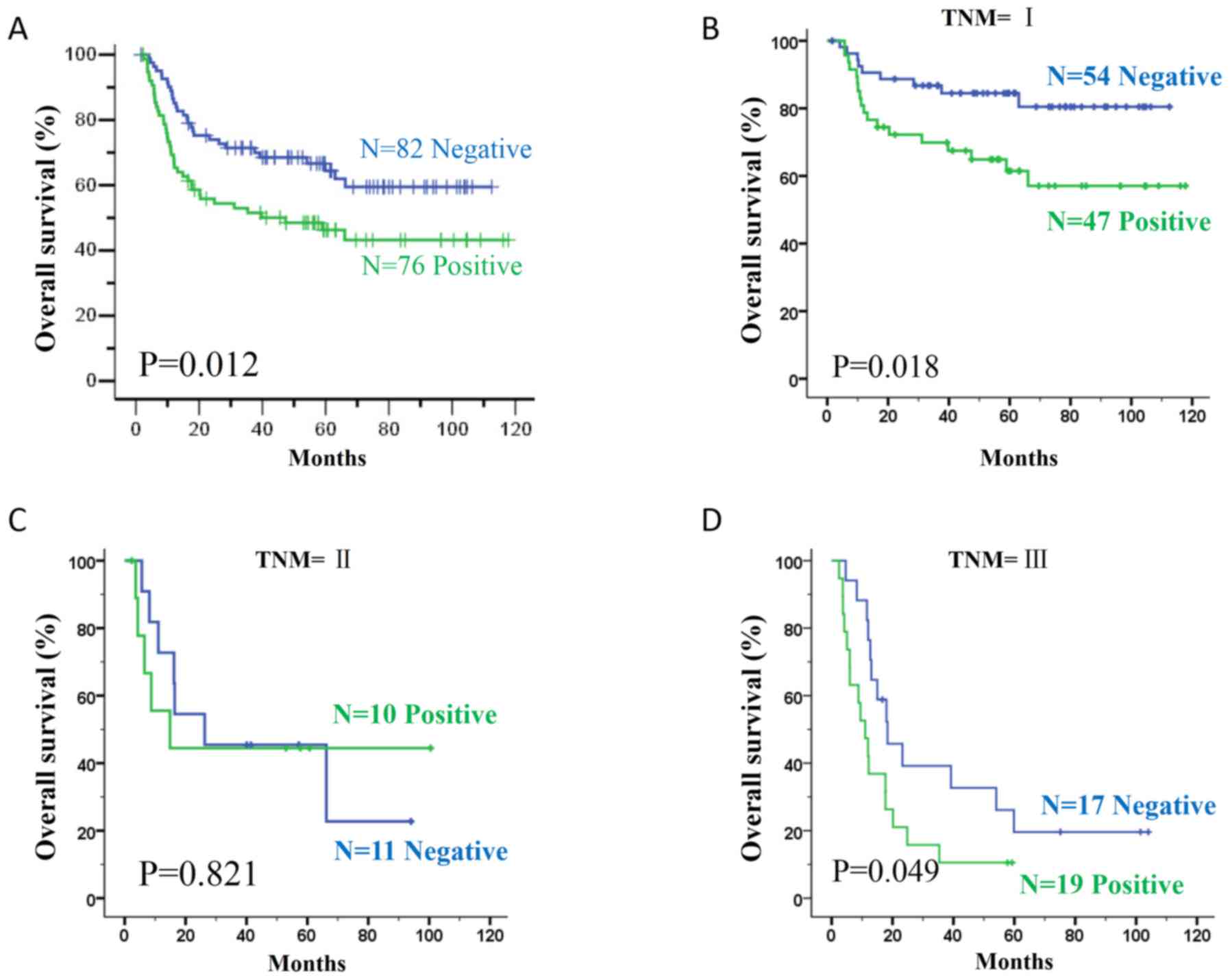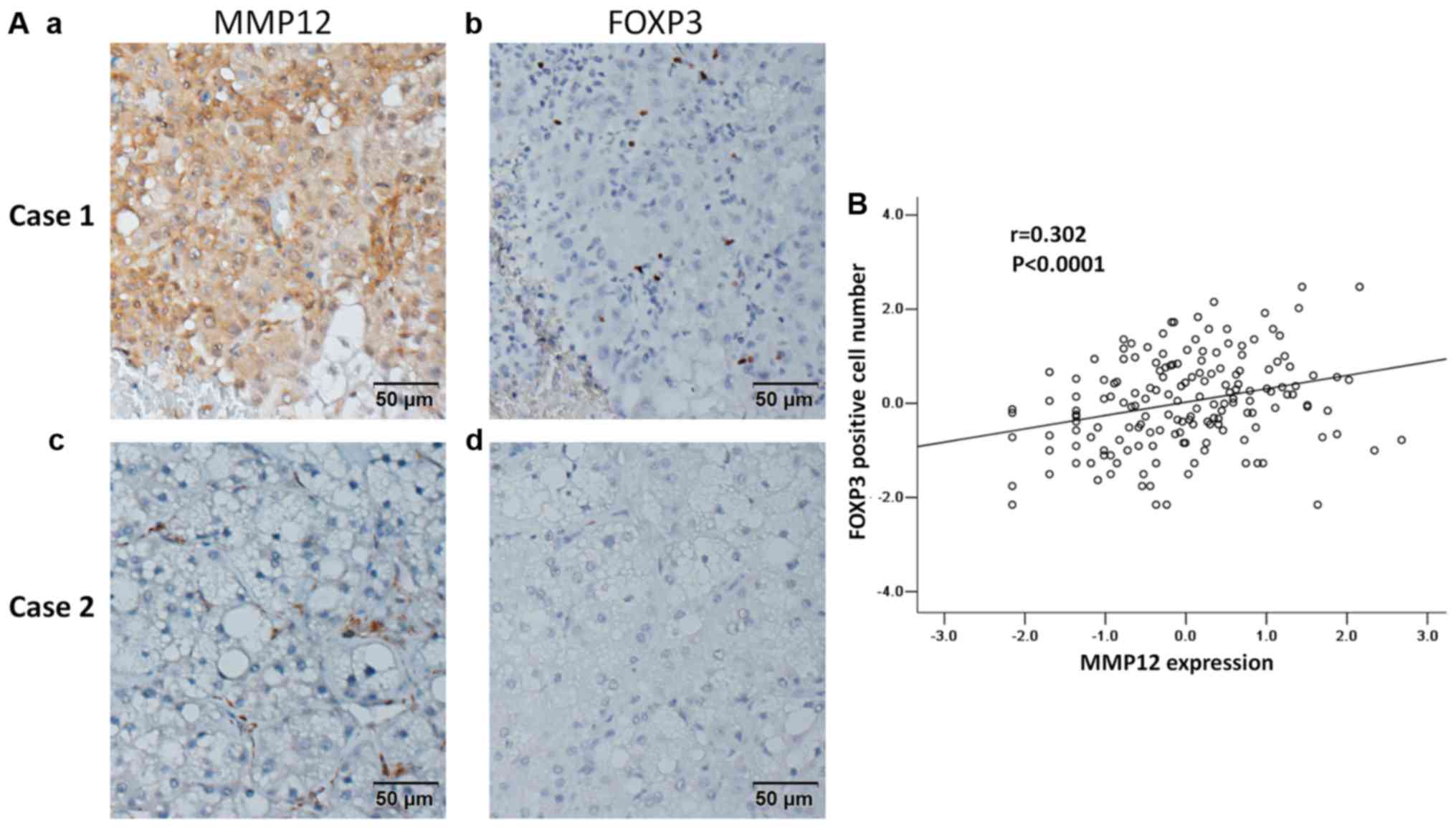|
1
|
Jemal A, Bray F, Center MM, Ferlay J, Ward
E and Forman D: Global cancer statistics. CA Cancer J Clin.
61:69–90. 2011. View Article : Google Scholar : PubMed/NCBI
|
|
2
|
Forner A, Llovet JM and Bruix J:
Hepatocellular carcinoma. Lancet. 379:1245–1255. 2012. View Article : Google Scholar : PubMed/NCBI
|
|
3
|
Hassan MM, Hwang LY, Hatten CJ, Swaim M,
Li D, Abbruzzese JL, Beasley P and Patt YZ: Risk factors for
hepatocellular carcinoma: Synergism of alcohol with viral hepatitis
and diabetes mellitus. Hepatology. 36:1206–1213. 2002. View Article : Google Scholar : PubMed/NCBI
|
|
4
|
Chen W, Zheng R, Baade PD, Zhang S, Zeng
H, Bray F, Jemal A, Yu XQ and He J: Cancer statistics in China,
2015. CA Cancer J Clin. 66:115–132. 2016. View Article : Google Scholar : PubMed/NCBI
|
|
5
|
Villanueva A, Hoshida Y, Battiston C,
Tovar V, Sia D, Alsinet C, Cornella H, Liberzon A, Kobayashi M,
Kumada H, et al: Combining clinical, pathology, and gene expression
data to predict recurrence of hepatocellular carcinoma.
Gastroenterology. 140:1501–1512.e2. 2011. View Article : Google Scholar : PubMed/NCBI
|
|
6
|
Bruix J, Boix L, Sala M and Llovet JM:
Focus on hepatocellular carcinoma. Cancer Cell. 5:215–219. 2004.
View Article : Google Scholar : PubMed/NCBI
|
|
7
|
Shapiro SD, Kobayashi DK and Ley TJ:
Cloning and characterization of a unique elastolytic
metalloproteinase produced by human alveolar macrophages. J Biol
Chem. 268:23824–23829. 1993.PubMed/NCBI
|
|
8
|
Nagase H and Woessner JF Jr: Matrix
metalloproteinases. J Biol Chem. 274:21491–21494. 1999. View Article : Google Scholar : PubMed/NCBI
|
|
9
|
Hunninghake GM, Cho MH, Tesfaigzi Y,
Soto-Quiros ME, Avila L, Lasky-Su J, Stidley C, Melén E, Söderhäll
C, Hallberg J, et al: MMP12, lung function, and COPD in high-risk
populations. N Engl J Med. 361:2599–2608. 2009. View Article : Google Scholar : PubMed/NCBI
|
|
10
|
Kerkelä E, Ala-Aho R, Jeskanen L, Rechardt
O, Grénman R, Shapiro SD, Kähäri VM and Saarialho-Kere U:
Expression of human macrophage metalloelastase (MMP-12) by tumor
cells in skin cancer. J Invest Dermatol. 114:1113–1119. 2000.
View Article : Google Scholar : PubMed/NCBI
|
|
11
|
Curci JA, Liao S, Huffman MD, Shapiro SD
and Thompson RW: Expression and localization of macrophage elastase
(matrix metalloproteinase-12) in abdominal aortic aneurysms. J Clin
Invest. 102:1900–1910. 1998. View
Article : Google Scholar : PubMed/NCBI
|
|
12
|
Kerkelä E, Ala-aho R, Klemi P, Grénman S,
Shapiro SD, Kähäri VM and Saarialho-Kere U: Metalloelastase
(MMP-12) expression by tumour cells in squamous cell carcinoma of
the vulva correlates with invasiveness, while that by macrophages
predicts better outcome. J Pathol. 198:258–269. 2002. View Article : Google Scholar : PubMed/NCBI
|
|
13
|
Cheng P, Jiang FH, Zhao LM, Dai Q, Yang
WY, Zhu LM, Wang BJ, Xu C, Bao YJ and Zhang YJ: Human macrophage
metalloelastase correlates with angiogenesis and prognosis of
gastric carcinoma. Dig Dis Sci. 55:3138–3146. 2010. View Article : Google Scholar : PubMed/NCBI
|
|
14
|
Yang W, Arii S, Gorrin-Rivas MJ, Mori A,
Onodera H and Imamura M: Human macrophage metalloelastase gene
expression in colorectal carcinoma and its clinicopathologic
significance. Cancer. 91:1277–1283. 2001. View Article : Google Scholar : PubMed/NCBI
|
|
15
|
Cho NH, Hong KP, Hong SH, Kang S, Chung KY
and Cho SH: MMP expression profiling in recurred stage IB lung
cancer. Oncogene. 23:845–851. 2004. View Article : Google Scholar : PubMed/NCBI
|
|
16
|
Li Y, Jia JH, Kang S, Zhang XJ, Zhao J,
Wang N, Zhou RM, Sun DL, Duan YN and Wang DJ: The functional
polymorphisms on promoter region of matrix metalloproteinase-12,
−13 genes may alter the risk of epithelial ovarian carcinoma in
Chinese. Int J Gynecol Cancer. 19:129–133. 2009. View Article : Google Scholar : PubMed/NCBI
|
|
17
|
Balaz P, Friess H, Kondo Y, Zhu Z,
Zimmermann A and Buchler MW: Human macrophage metalloelastase
worsens the prognosis of pancreatic cancer. Ann Surg. 235:519–527.
2002. View Article : Google Scholar : PubMed/NCBI
|
|
18
|
Gershon RK and Kondo K: Cell interactions
in the induction of tolerance: The role of thymic lymphocytes.
Immunology. 18:723–737. 1970.PubMed/NCBI
|
|
19
|
Sakaguchi S, Yamaguchi T, Nomura T and Ono
M: Regulatory T cells and immune tolerance. Cell. 133:775–787.
2008. View Article : Google Scholar : PubMed/NCBI
|
|
20
|
Yagi H, Nomura T, Nakamura K, Yamazaki S,
Kitawaki T, Hori S, Maeda M, Onodera M, Uchiyama T, Fujii S and
Sakaguchi S: Crucial role of FOXP3 in the development and function
of human CD25+CD4+ regulatory T cells. Int Immunol. 16:1643–1656.
2004. View Article : Google Scholar : PubMed/NCBI
|
|
21
|
Campbell DJ and Ziegler SF: FOXP3 modifies
the phenotypic and functional properties of regulatory T cells. Nat
Rev Immunol. 7:305–310. 2007. View
Article : Google Scholar : PubMed/NCBI
|
|
22
|
Fontenot JD, Gavin MA and Rudensky AY:
Foxp3 programs the development and function of CD4+CD25+ regulatory
T cells. Nat Immunol. 4:330–336. 2003. View
Article : Google Scholar : PubMed/NCBI
|
|
23
|
Hori S, Nomura T and Sakaguchi S: Control
of regulatory T cell development by the transcription factor Foxp3.
Science. 299:1057–1061. 2003. View Article : Google Scholar : PubMed/NCBI
|
|
24
|
Khattri R, Cox T, Yasayko SA and Ramsdell
F: Pillars article: An essential role for Scurfin in CD4+CD25+ T
regulatory cells. Nat. Immunol. 4: 337–342. J Immunol. 198:993–998.
2017.PubMed/NCBI
|
|
25
|
Tanaka A and Sakaguchi S: Regulatory T
cells in cancer immunotherapy. Cell Res. 27:109–118. 2017.
View Article : Google Scholar : PubMed/NCBI
|
|
26
|
Schreiber TH: The use of FoxP3 as a
biomarker and prognostic factor for malignant human tumors. Cancer
Epidemiol Biomarkers Prev. 16:1931–1934. 2007. View Article : Google Scholar : PubMed/NCBI
|
|
27
|
World medical association declaration of
helsinki: Ethical principles for medical research involving human
subjects. JAMA. 284:3043–3045. 2000. View Article : Google Scholar : PubMed/NCBI
|
|
28
|
Xu J, Ding T, He Q, Yu XJ, Wu WC, Jia WH,
Yun JP, Zhang Y, Shi M, Shao CK, et al: An in situ molecular
signature to predict early recurrence in hepatitis B virus-related
hepatocellular carcinoma. J Hepatol. 57:313–321. 2012. View Article : Google Scholar : PubMed/NCBI
|
|
29
|
Edge SB and Compton CC: The American Joint
Committee on Cancer: The 7th edition of the AJCC cancer staging
manual and the future of TNM. Ann Surg Oncol. 17:1471–1474. 2010.
View Article : Google Scholar : PubMed/NCBI
|
|
30
|
Edmondson HA and Steiner PE: Primary
carcinoma of the liver: A study of 100 cases among 48,900
necropsies. Cancer. 7:462–503. 1954. View Article : Google Scholar : PubMed/NCBI
|
|
31
|
Huang W, Hennrick K and Drew S: A colorful
future of quantitative pathology: Validation of Vectra technology
using chromogenic multiplexed immunohistochemistry and prostate
tissue microarrays. Hum Pathol. 44:29–38. 2013. View Article : Google Scholar : PubMed/NCBI
|
|
32
|
Li L, Xu L, Yan J, Zhen ZJ, Ji Y, Liu CQ,
Lau WY, Zheng L and Xu J: CXCR2-CXCL1 axis is correlated with
neutrophil infiltration and predicts a poor prognosis in
hepatocellular carcinoma. J Exp Clin Cancer Res. 34:1292015.
View Article : Google Scholar : PubMed/NCBI
|
|
33
|
Livak KJ and Schmittgen TD: Analysis of
relative gene expression data using real-time quantitative PCR and
the 2(-Delta Delta C(T)) method. Methods. 25:402–408. 2001.
View Article : Google Scholar : PubMed/NCBI
|
|
34
|
Ng KT, Qi X, Kong KL, Cheung BY, Lo CM,
Poon RT, Fan ST and Man K: Overexpression of matrix
metalloproteinase-12 (MMP-12) correlates with poor prognosis of
hepatocellular carcinoma. Eur J Cancer. 47:2299–2305. 2011.
View Article : Google Scholar : PubMed/NCBI
|
|
35
|
Gorrin-Rivas MJ, Arii S, Mori A, Takeda Y,
Mizumoto M, Furutani M and Imamura M: Implications of human
macrophage metalloelastase and vascular endothelial growth factor
gene expression in angiogenesis of hepatocellular carcinoma. Ann
Surg. 231:67–73. 2000. View Article : Google Scholar : PubMed/NCBI
|
|
36
|
Shimizu-Hirota R, Xiong W, Baxter BT,
Kunkel SL, Maillard I, Chen XW, Sabeh F, Liu R, Li XY and Weiss SJ:
MT1-MMP regulates the PI3Kδ Mi-2/NuRD-dependent control of
macrophage immune function. Genes Dev. 26:395–413. 2012. View Article : Google Scholar : PubMed/NCBI
|
|
37
|
Marchant DJ, Bellac CL, Moraes TJ,
Wadsworth SJ, Dufour A, Butler GS, Bilawchuk LM, Hendry RG,
Robertson AG, Cheung CT, et al: A new transcriptional role for
matrix metalloproteinase-12 in antiviral immunity. Nat Med.
20:493–502. 2014. View
Article : Google Scholar : PubMed/NCBI
|
|
38
|
Page-McCaw A, Ewald AJ and Werb Z: Matrix
metalloproteinases and the regulation of tissue remodelling. Nat
Rev Mol Cell Biol. 8:221–233. 2007. View
Article : Google Scholar : PubMed/NCBI
|
|
39
|
Kessenbrock K, Plaks V and Werb Z: Matrix
metalloproteinases: Regulators of the tumor microenvironment. Cell.
141:52–67. 2010. View Article : Google Scholar : PubMed/NCBI
|
|
40
|
Qu P, Yan C and Du H: Matrix
metalloproteinase 12 overexpression in myeloid lineage cells plays
a key role in modulating myelopoiesis, immune suppression and lung
tumorigenesis. Cancer Res. 117:4476–4489. 2011.
|

















